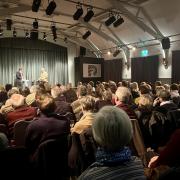Agricultural policy is set to change, but home food production should be a priority
The future of farming has never been so uncertain. The last Agriculture Act for the UK was signed off in 1947 as a result of the Second World War during which the threat of hunger was of real concern as demonstrated by rationing which stayed with us until 1954.
The Act remained in place until 1975 when we finally join the European Economic Community when the Act was superseded by the Common Agricultural Policy, which has remained with us to this day.
It was based on financial support and inducements to farmers to make sure food remained plentiful across Europe, but for every action there is of course a reaction, and this is never more visible than with Government policy.
My father is soon to be 90! In his career he has witnessed every idiosyncratic foible of policy makers who were trying to create an equitable playing field, from the ‘barley baron plains’ of East Anglia to the peasant olive grower of the Greek Islands.
In 1956, when taking on the tenancy of a farm on the edge of the Quantocks, Dad benefited enormously from a grant that paid farmers £10 per acre to plough up land that had never been cultivated so the farm would produce more food. Payments for producing cereals extended into the 80s when the markets became flooded – remember wine lakes, wheat and butter mountains, which led in 1991 to the ridiculous ‘set aside’ policy? Dad was then paid £115 per acre NOT to produce anything from at least 15% of his total arable acreage. Some farmers set-aside their entire farm!
The same scenario happened to me while sheep farming. At the start of my career in the mid-1980s I was paid a subsidy on the production of quality lamb. If an animal did not pass the Ministry grader, I got nothing. Run the clock on 20 years and I was paid up to £24 per female sheep providing I kept her for 100 days from February to early May, and she did not even have to bear a lamb. Existence payment!
Latterly farmers have been paid for the number of acres they farm with the top 10% of landowners reaping 50% of £3.1billion pot and the remaining 90% have a morsel over the rest. This unfair and divisive system has triggered the Government to overhaul the support function in the new Agriculture Bill that is going through Parliament now in readiness for the UK leaving the EU.
I hope the Government continues to support sustainable food production that also protects the environment, and for those who scoff at the £3.1 billion, let’s put this into perspective: £3.1 billion will keep the NHS going for just nine days and is only a third of the £10.5 billion the UK spends on overseas development.
I would suggest that to protect our food welfare standards and increase innovation and productivity in food production while encouraging farmers to continue to protect the landscape and wildlife is good value for the tax payer. Do we really want hormone-pumped beef from South America, or chlorine-tossed chicken from the USA, or lamb and dairy products from New Zealand where environmental standards have slipped since they gave up farm support? No!
Come on Government, support British farming and, excuse the pun, don’t bite the hands that feed the nation! No farmer, no food!
Rupert Cox is the CEO of the Royal Bath and West Society. For more from Rupert, follow him on Twitter! @rupert_rbw



























